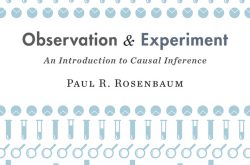Relative und absolute Risiken Das absolute Risiko einer medizinischen Intervention unterscheidet sich dabei vom relativen Risiko. Das wird an einem Beispiel klar: Angenommen, bei einem Test kann durch ein Medikament die Zahl der Erkrankungen von 10 auf 5 Fälle bei 1000 Personen reduziert werden. Relativ gesehen ist das eine Reduzierung des Krankheitsrisikos um 50 Prozent (5 von 10). Absolut gesehen sind es jedoch nur 0,5 Prozent (5 von 1000). Die erste Zahl...
Read More »Is economic consensus a good thing?
Is economic consensus a good thing? No, it is not — and here’s one strong reason why: The mere existence of consensus is not a useful guide. We should ask; Does a consensus have its origins and its ground in a rational and comprehensive appraisal of substantial evidence? Has the available evidence been open to vigorous challenge, and has it met each challenge? … A consensus that lacks these origins is of little consequence precisely because it lacks these...
Read More »Dagens humaniora — identitetspolitisk mumbo jumbo
Dagens humaniora — identitetspolitisk mumbo jumbo Nu har det hänt igen. Tre amerikanska akademiker har ägnat ett helt år åt att producera falska artiklar, som de sedan fått publicerade i ledande Cultural Studies-tidskrifter … Gemensamt för de falska artiklarna är att de driver frågor om förtryck, maktrelationer och identitetspolitik, men skruvat på ett sätt som inte borde ha passerat normal vetenskaplig granskning. Det kanske mest häpnadsväckande exemplet...
Read More »The American Time Zone
The American Time Zone Advertisements
Read More »So schlecht steht es um den freien Journalismus in der Türkei
So schlecht steht es um den freien Journalismus in der Türkei Daraufhin machte Erdoğan einen Zug. Am Abend vor der Pressekonferenz erklärte er: “Wenn er kommt, gehe ich nicht hin.” Wie sonderbar für einen Journalisten, wenn ein Staatspräsident sagt: Er oder ich! … Ich entschied, nicht hinzugehen. Auch ohne eine Frage von mir hatte Erdoğan offenbart, wie er zur Presse steht … Vielsagend sprach Steinmeier beim Bankett die vor der NS-Diktatur in die Türkei...
Read More »Healing my soul (personal)
Healing my soul (personal) [embedded content] Till minnet av ‘Bimpen’ (1956–2018). En vän non plus ultra. Advertisements
Read More »Livet på landet
[embedded content] Advertisements
Read More »Woodward’s Furcht
DIE ZEIT: Herr Woodward, niemand hat tiefere Einblicke in die US-Regierungen der vergangenen 45 Jahre als Sie. Sie haben über Richard Nixon im Weißen Haus recherchiert und über mehrere seiner Nachfolger. Wie hebt sich Trump von seinen Vorgängern ab? Bob Woodward: Nun, Nixon war der Schlimmste, er war ein Krimineller. Er hat seine Macht als Präsident dazu missbraucht, sich an den Demokraten zu rächen und den Wahlprozess zu beeinflussen. Dazu hat er das Gesetz gebrochen. Von...
Read More »Krugman and ‘neutral money’
Krugman and ‘neutral money’ Paul Krugman has repeatedly over the years argued that we should continue to use mainstream hobby horses like IS-LM and AS-AD models. Here’s one example: So why do AS-AD? … We do want, somewhere along the way, to get across the notion of the self-correcting economy, the notion that in the long run, we may all be dead, but that we also have a tendency to return to full employment via price flexibility. Or to put it differently,...
Read More »Kurt Waldheim and national amnesia
Kurt Waldheim and national amnesia Kurt Waldheim war kein Verbrecher. Jedenfalls kein Verbrecher großen Stils. Er war Karrierist und Opportunist, ein Nazi und Antisemit, der nach dem Krieg erfolgreich seine Vergangenheit umdeutete, sich als Opfer der Nazis hinstellte und es damit sehr weit brachte. Er war, mit einem Wort, Österreicher. Was Waldheim interessant macht, ist nicht die Tatsache, dass er mit seiner Vergangenheit zehn Jahre lang UN-Generalsekretär...
Read More » Lars P. Syll
Lars P. Syll








